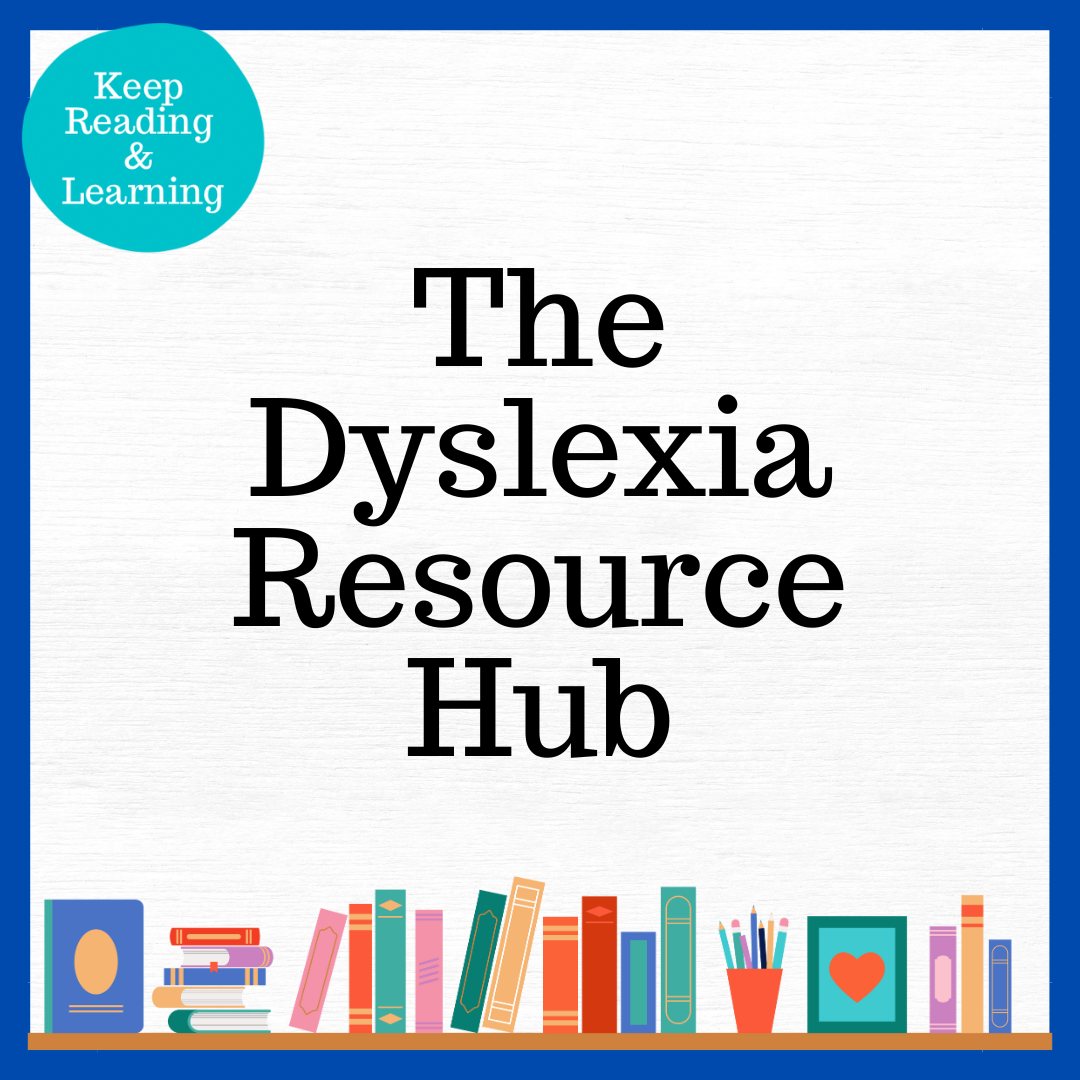Dyslexia resources for teachers can be hard to track down, so I’ve gathered my most helpful blogs, book recommendations, and links into one easy-to-use hub. Whether you’re new to learning about dyslexia or ready to dive deeper into evaluation, co-occurring conditions, and classroom strategies, this page will guide you to what you need. Bookmark this hub! I’ll keep it updated with new dyslexia resources for teachers as they’re added.

Dyslexia Resources for Teachers: Let’s Cover the Basics
Post: Dyslexia 101: Key Concepts Made Easy: a comprehensive overview of dyslexia, including its definition, prevalence, characteristics, and factors that impact the development of reading and spelling skills
Post: Challenging Dyslexia Myths: Seeing Beyond the Stereotypes: Let’s separate fact from fiction, and discuss topics like whether or not people with dyslexia read backwards or if dyslexia can be caused by poor instruction.
Post: Once you understand the basics, you can dive into The Role of Phonological Awareness & Rapid Naming in the identification of dyslexia. These two skills play a major role in the evaluation process!

Dyslexia Resources for Teachers Involved in the Evaluation Process

Post: Understanding the CTOPP-2: A Guide for Teachers and Parents: If a student is struggling with early reading skills and you want to know why, the CTOPP-2 is likely to reveal part of the puzzle.
Post: If you’ve given the CTOPP-2 but sometimes feel at a loss when it’s time to interpret the scores, dive into the next post, CTOPP-2 Score Interpretation: How to Write Clearer Reports

Diagnoses That Often Co-Occur with Dyslexia
Post: Children with dyslexia and children with ADHD often exhibit similar characteristics when it comes to difficulties in reading and writing. The shared aspects of these diagnoses can make it tricky to know which conditions might be the culprit! Learn the similarities and differences between readers with dyslexia and readers with ADHD in A Tale of Two Conditions: ADHD and Dyslexia.
Post: Learn about the overlap between dyslexia and dysgraphia in Dysgraphia 101: A Teacher’s Guide to Understanding and Supporting Students.

Dyslexia Resources for Kids
Post: Talking to Kids About Their Learning Differences: Practical conversation tips and kid-friendly book recommendations to help you empower children to embrace their unique brains.
This post contains affiliate links. I may earn a small commission if you buy through them, at no extra cost to you. Using my links helps me keep sharing helpful structured literacy ideas!

Book: How Your Brain Learns to Read by Denise Eide. While this book does not specifically address dyslexia, it is a perfect book for parents who are learning about the science of reading alongside their children.
Book: Dyslexia Explained: Without the Need for Too Many Words by Mike Jones. The founder of Nessy wrote this book with the intention of helping “parents and children quickly understand dyslexia without having to read too many words.” We can get behind that!
Book: What I Need: Dyslexics Can Reach the Stars and Shine by Tiffany James. Another title from the creators of Nessy, this book a good pick if your young student is feeling disheartened about their reading struggles.
Book: Calling All Neurons!: How Reading and Spelling Happen by Lori C. Josephson. Ideal for older students, this book provides a scientific but still accessible overview of how the brain processes reading and spelling.
Book: How We Read: A Graphic Guide to Literacy from the Center for Cartoon Studies. Available as a free download that can also be purchased in a print version, this book offers a relatable and accessible way to grasp what dyslexia is and how the reading brain works.

How and Where to Learn More About Dyslexia
Resource: International Dyslexia Association website; The IDA Fact Sheets are an incredible resource. Each one packs essential information into well-organized and brief publications about a variety of topics, ranging from Dyslexia Basics to Applying for Accommodations on College Entrance Tests.
Post: Learn about certification options and find out which path I took to become a Wilson Dyslexia Practitioner and a Structured Literacy Dyslexia Interventionist in Reading Certification Options: Become a Dyslexia Interventionist.
Post: Browse the list of 8 Science of Reading Courses Every Teacher Should Consider, which includes the courses Understanding Dyslexia and A Closer Look at Dyslexia, Dysgraphia, and Dyscalculia.

My Favorite Dyslexia Books for Teachers
Post: Check out my Top 10 Books for Learning About the Science of Reading, which includes the titles listed below.

Book: In order to understand dyslexia, you’ll need a foundational knowledge of the typical development of reading and spelling skills. Equipped For Reading Success: A Comprehensive, Step-By-Step Program for Developing Phonemic Awareness and Fluent Word Recognition by David A. Kilpatrick is an easy read for folks who feel that they are beginners in their knowledge of literacy skills.
Book: For folks ready to develop a deeper knowledge of literacy skills, Speech to Print: Language Essentials for Teachers by Louisa Moats will get you up to snuff on the principles and practices of structured literacy.
Book: For special educators and folks who are part of evaluation teams, Essentials of Assessing, Preventing, and Overcoming Reading Difficulties and Essentials of Dyslexia Assessment and Intervention will help you develop your ability to assess for dyslexia and to provide effective intervention for it.




Comments (9)
Comments are closed.